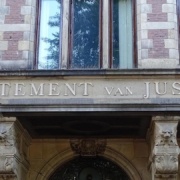International and Dutch matrimonial law Q&A
One of the less obvious effects of globalisation is the growing number of international marriages worldwide. Online news platform Lawyer Monthly did an interview with international family law expert Antoine de Werd from GMW lawyers, The Hague, the Netherlands. The interview was about the marital property regime as well as issues of competence and applicable law in divorce cases in The Netherlands.
How does the Hague Convention affect matrimonial property regimes?
Legally speaking, an international marriage is not limited to a family unit where the spouses have different nationalities. An English couple moving to the Netherlands also has an international dimension. The same goes for a Dutch couple with immovable property abroad. Only when both you and your spouse have Dutch nationality from the moment of marriage, have always lived in the Netherlands and/or have no assets abroad, Dutch law is always applicable. In all other cases there is an international element.
Each country, according to its Private International Law, decides on the applicable regime to the matrimonial property of spouses. In the Netherlands, for marriages entered into after September 1st 1992, the Hague Convention (1978) on Private International Law decides when couples with an international dimension are subject to Dutch matrimonial law or to the corresponding law of another country. As the financial implications of the applicable national law can differ widely per state, the Hague Convention can have tremendous consequences.
What if Dutch law is applicable to your matrimonial property?
If Dutch law is applicable, the matrimonial regime of ‘general community of property’ applies. This is, if you have not made a pre-nuptial agreement stating otherwise. This means that you and your spouse’s assets and debts are shared from the moment you marry. This concerns assets and debts acquired either previous to the marriage or amassed following an inheritance or gift – and is independent of the name in which the assets or debts have been registered, . If the marriage ends as the result of a divorce or death of one of the partners, the property is divided equally among the partners.
What are advantages and disadvantages of the pre-nuptial agreement?
The far-reaching consequences of the Dutch property regime can, however, be avoided by concluding a marriage contract or pre-nuptial agreement. In this agreement, the couple indicates which country’s law should apply to their matrimonial property. Or, if Dutch law is applicable, make a pre-nuptial agrement to prevent your spouse’s creditors making claims on your property. Furthermore, on the termination of marriage by death or divorce, the debts and assest are divided according to the terms of the contract in the case of a pre-nuptial agreement.
You must, however, keep in mind that not all states recognize pre-nuptial agreements made in the Netherlands. English Courts, for instance, do not attach great value to pre-nuptial agreements, even when it contains a choice for the law of another state. Divorcing expats are often stunned by the consequences of the regime of the community of assets and property. Likewise, Duch nationals living abroad often assume that the Dutch regime of community of assets and property is applicable to their matrimonial wealth, if they were married in The Netherlands and have not signed any prenuptial agreement. This, however, is often not the case and things can get messy and complicated. A Dutch couple, married under Dutch law but filing for divorce in a foreign country might find that the international private law of the host country overrules the provisions of Dutch family law, most often to the detriment of the parties.
What can you say about the competence of a judge and applicability of law in case of an international divorce?
More often than not, an international marriage will incorporate aspects that may be subject to different national legislations. Take the circumstance of filing for divorce; in Switzerland and Ireland divorce can be filed only after a mandatory period of separation. The handling of matrimonial property and the division thereof will differ greatly in, for example, Great Britain and in The Netherlands. These states deal differently with spousal and child alimony and the duration thereof. Even the rather obvious question of paternity could be a cause for surprise, depending on the applicable law. International treaties on private law add to the confusion. This is bacause legality and reality greatly depend on the interpretation of the judge in the local courts.
International couples intending to divorce are therefore well-advised to first examine all available alternatives and the consequences thereof, before establishing the competent court and the applicable (national) law for each of the aspects below:
- the divorce itself;
- parental responsibility and custody for the children involved;
- child alimony;
- spousal alimony;
- division of property and assets;
- division of pension rights.
Sometimes, the application of different national rules of private international law can lead to different, sometimes contradictory results. Suppose it is possible to file for divorce in two countries and the spouses cannot agree and file for divorce in both countries. In this case, the divorce procedures filed last will have to be suspended, until a ruling is passed in the country where the petition for divorce was filed first.
Have there been any recent legislative changes regarding child custody law?
Since March 1, 2010, the parenting plan is part of the divorce application process in the Netherlands. This means that parents filing for divorce have the obligation to discuss child related issues like care, development and education before they file for divorce. This way the Dutch Government wants to reduce the number of problems arising in relation to divorce and parental access. Such a plan also provides a framework for the parental obligation to promote closer ties between the minor and the other parent. It is in the child’s interest that contact is maintained with both parents. This is in line with the European Convention for the protection of Human Rights and Fundamental Freedoms (ECHR) and the United Nations Convention on the Rights of the Child (CRC).
Do you have a question about matrimonial law in The Netherlands? Please contact us – we’ll be glad to help.
Antoine de Werd is a partner and head of the family law section at GMW lawyers. He studied Business Law at the University of Leiden and was admitted to the The Hague Supreme Court Bar in 1989. Immediately after, he started GMW lawyers as one of the founders.
Throughout his career, Antoine has concentrated on resolving financial disputes involving high net worth individuals and families. He is one of the few male specialised divorce lawyers in the Netherlands and has substantial legal experience in (international) divorces, especially those involving companies, complex maintenance claims, division of assets/property, retirement benefits and set-off clauses.
Antoine understands that divorce and separation are difficult times. Rather than focusing on the current painful situation, Antoine helps his clients achieve their goal: getting the best solution for their divorce.
A trained mediator as well as a collaborative divorce practitioner, Antoine is also an experienced litigator, so should an out of court settlement fail, he will represent you in court.
Antoine is a member of the Association of Family lawyers and Divorce Mediators (vFas) and the Association of Collaborative Divorce (VvCP).










